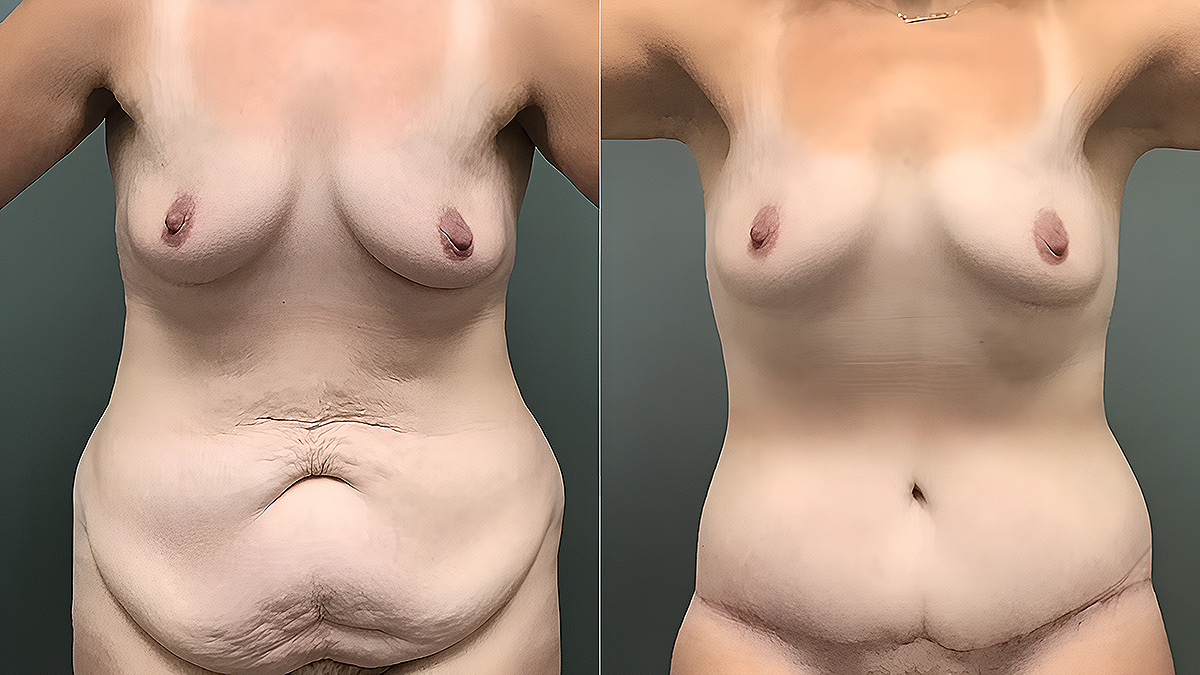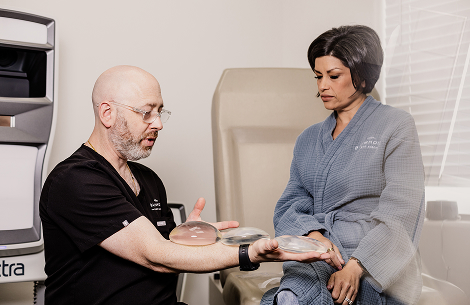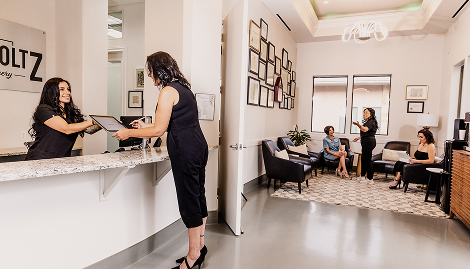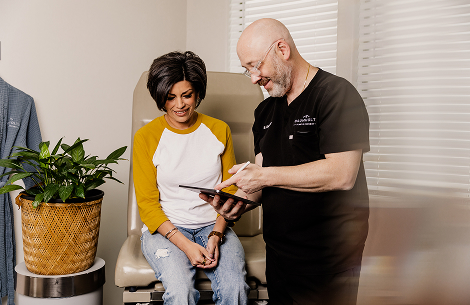
A tummy tuck (abdominoplasty) is a powerful surgical option to reshape the abdomen, remove excess skin, and restore confidence. At Baumholtz Plastic Surgery in San Antonio, TX, Dr. Michael Baumholtz, a dual-board-certified Plastic Surgeon, knows that your journey doesn’t start in the OR - it starts with preparation. That’s why we’ve created this practical, patient-first guide to help you feel ready, informed, and supported every step of the way. It’s not just about packing a bag - it’s about preparing your body, mind, and home for one of the most transformative experiences of your life.
Why Preparation Matters More Than You Think
Packing may seem like a checklist task, but it goes deeper. Being ready physically and emotionally can dramatically influence your recovery. Planning ahead reduces anxiety, limits stress during healing, and helps you stay focused on what truly matters - your transformation.
When you prepare with intention, you create an environment where healing can happen more efficiently. Every item you bring with you, every step you organize in advance, can provide comfort, reassurance, and a sense of control in a time when your body is undergoing significant change. Whether it's the calm of knowing your medications are pre-filled or the relief of finding your robe right where you need it, thoughtful preparation can turn a chaotic experience into a manageable and even empowering one.
Dr. Michael Baumholtz encourages every patient to approach surgery with calm readiness. At our San Antonio practice, your comfort and clarity matter as much as the procedure itself.
Packing Starts With Mindset
Patients often focus on logistics - what to wear, what to bring. But mindset is just as important. Ask yourself: What will help me feel most supported during this time? Think comfort, simplicity, and emotional ease. Take the time to envision your post-op days: where will you sleep, how will you reach what you need, who will help?
Preparing for surgery isn’t just about physical tools - it’s about creating a headspace that prioritizes rest, recovery, and self-compassion. The more mentally prepared you are, the more patient and resilient you’ll feel when dealing with discomfort or setbacks. Expect some discomfort, but know it’s part of the process. Dr. Baumholtz and his team are here to help you navigate not only the medical journey but the emotional one as well.
Essentials You Shouldn’t Leave Home Without
Every surgery day starts with the basics. Bringing essential documents like your ID, completed paperwork, and medication list may seem minor, but they’re vital for a seamless check-in. Having everything ready eliminates unnecessary stress and ensures our team can focus entirely on your care.
Your clothing choices should also reflect your healing needs. After surgery, your body will be sensitive to movement, pressure, and touch. Loose, soft, and easily removable garments will make dressing easier and protect the incision site. Avoid anything tight or complicated - now is not the time for stylish outfits, but for functional, soothing materials. Comfort-first attire allows you to focus on healing, not fussing with zippers or waistbands.
Thoughtful Touches That Make A Big Difference
It’s easy to underestimate the importance of comfort items. But after surgery, even brushing your hair or freshening up can feel like a small victory. Including items like dry shampoo, facial wipes, and lip balm helps maintain a sense of normalcy. Looking and feeling like yourself, even in small ways, can lift your spirits and support your mental well-being.
Emotional comforts - like a favorite blanket or relaxing entertainment - aren’t luxuries. They’re tools for grounding you through the ups and downs of recovery. Whether you’re dozing in a recliner or passing time between naps, small personal items can bring a sense of peace and control during a time that can feel unpredictable.
Medications, Drains & Garments - Be Ready, Not Rushed
Medications are a cornerstone of your recovery plan. Pain relief, nausea control, antibiotics, and stool softeners all play specific roles in keeping you comfortable and safe. Having them filled before surgery eliminates unnecessary errands and ensures that every dose is available when you need it. Setting up a designated medication station at home helps keep everything organized.
Dr. Baumholtz typically places surgical drains to manage post-operative fluid. These are temporary but essential tools for preventing complications like seromas. Managing them sounds intimidating, but with a little instruction, most patients do quite well. Knowing what to expect helps reduce anxiety.
Compression garments, once drains are removed, offer support, reduce swelling, and promote better final results. Wearing them as instructed enhances the contouring work done in the OR. At Baumholtz Plastic Surgery, we walk each patient through this step, ensuring you feel comfortable and informed about your post-op routine.
Set Up Your Recovery Nest At Home
Your recovery doesn’t end at the clinic - it continues in your home. Setting up a dedicated, peaceful space is one of the most loving things you can do for yourself. Choose a location that minimizes movement and allows for safe, supported rest.
Your bed or recliner should be outfitted with extra pillows to support a slightly bent position. This protects your abdominal repair and prevents strain on the incision. Keep essentials within arm’s reach - medications, water, tissues, wipes, and your phone. Safety is critical too: nightlights, clear walking paths, and slip-proof rugs all help prevent accidental injury.
Your bathroom and kitchen need a little preparation as well. Arrange everything so you won’t have to reach, bend, or lift. Small changes in setup now can make a huge difference later when energy is low and movement is limited. This is one area where our San Antonio patients consistently say their effort paid off in comfort and peace of mind.
Must-Have Tools For A Smoother Week One
These tools may seem minor, but during the early days after surgery, they can be game changers. A pill organizer ensures you never miss a dose. A small pillow provides surprising relief when you need to cough or travel by car. Compression devices improve circulation and reduce the risk of blood clots - a serious post-op concern that Dr. Baumholtz addresses thoroughly with each patient.
Even practical tools like a long phone charger make your day easier. The more energy you conserve for healing, the smoother your recovery. Week one is about small victories - resting comfortably, staying hydrated, getting up safely. These tools help you get there.
Planning For Support: You Shouldn’t Do This Alone
Support after surgery isn’t just helpful - it’s vital. Having someone to assist you with everyday tasks allows you to rest without worry. Whether it’s a family member, close friend, or hired caregiver, this person will help you with medications, meal prep, walking support, and emotional reassurance.
As Dr. Michael Baumholtz emphasizes, recovery is a team effort. Leaning on others isn’t weakness - it’s wisdom. Patients who accept help often feel less isolated and more focused on healing. Your only job should be to recover. Let your support person handle the rest.
Things To Avoid (So You Don’t Set Yourself Back)
Many recovery setbacks come from avoidable mistakes. Overdoing it, lifting too soon, or failing to follow instructions can lead to pain, delayed healing, or even complications. Patients sometimes feel better before they’re truly ready to resume activities - this false confidence is risky.
Dr. Baumholtz encourages you to listen to your body. Fatigue, soreness, and swelling are signs that your body needs rest. Respect those signals. Keep movements slow and deliberate. Avoid tight clothing that can irritate incisions or dislodge dressings. And most importantly, stay hydrated and nourished. Healing demands energy, and your body can’t repair itself on fumes.
See Before and After Photos of Tummy Tuck Surgery
What Dr. Michael Baumholtz Wants Every Patient To Know
As a Plastic Surgeon in San Antonio, TX, Dr. Michael Baumholtz has seen the difference that preparation makes. His core advice comes down to this: be informed, be patient, and accept help. You are not expected to navigate this journey alone.
He also reminds patients that recovery isn’t linear. There will be days when you feel like you’ve turned a corner - and others when rest is all you can manage. This is normal. Trust the process. Follow your instructions. Ask questions. And most of all, give yourself grace.
With the right preparation and mindset, you can experience a smoother recovery and emerge more confident and comfortable in your own body.
Packing With Purpose: What This Says About Your Mindset
Packing for surgery isn’t just a task - it’s a statement. It says, “I’m taking this seriously. I’m investing in myself. I’m prioritizing my healing.” Each item you gather is a sign of self-respect and determination.
This preparation also reassures your loved ones and your care team. It shows that you’re engaged, informed, and proactive. That mindset makes a difference not only in how you experience surgery - but in how you heal afterward. Dr. Baumholtz and his team recognize the courage it takes to commit to a tummy tuck, and we honor that effort by giving you the tools and support to succeed.
FAQs About Packing And Preparing For Your Tummy Tuck
What kind of support will I realistically need at home during the first week?
You’ll need someone to help with meals, walking support, medication reminders, and emotional reassurance. Most patients also need help with drain management and getting in and out of bed safely.
Can I climb stairs after my tummy tuck if my bedroom is on the second floor?
Yes, you can climb stairs if necessary, but it should be done slowly and with assistance. Try to limit stair use in the first few days by preparing a temporary recovery area on the main floor if possible.
How soon should I start walking after surgery and how much is too much?
Walking is encouraged within 24 hours after surgery to reduce the risk of blood clots. Short, frequent walks around the house are ideal. Avoid long walks or anything that feels strenuous until cleared by Dr. Baumholtz.
Will I be able to care for my pets during recovery or should I arrange help?
It’s best to arrange help, especially with feeding, walking, or lifting pets. You’ll have limited mobility, and bending or sudden movements can strain your abdomen.
How do I know if what I'm feeling is normal or if I need to call the office?
Mild discomfort, swelling, and fatigue are normal. Call the office if you have a fever, increasing pain, foul-smelling drainage, or anything that feels concerning. Dr. Baumholtz’s team encourages questions and wants to hear from you.
Can I shower with my drains in or do I need to wait?
Dr. Baumholtz will give specific instructions based on your case. In most cases, sponge baths are recommended until the drains are removed, after which you’ll transition to showers with care.
Is there a preferred way to sit or get out of bed to avoid strain on my abdomen?
Yes. Sit with your knees slightly bent and back supported. To get out of bed, roll to your side, push up with your arms, and swing your legs down. Dr. Baumholtz and his team will show you the safest way during your post-op care.
Medical References
- Tummy tuck - Mayo Clinic
https://www.mayoclinic.org/tests-procedures/tummy-tuck/about/pac-20384892 - Tummy Tuck (Abdominoplasty): Surgery, Recovery, Risks & Results - Cleveland Clinic
https://my.clevelandclinic.org/health/procedures/11017-tummy-tuck - Abdominoplasty - StatPearls - NCBI Bookshelf
https://www.ncbi.nlm.nih.gov/books/NBK431058/ - Preparing For Your Surgery or Procedure - Mayo Clinic (PDF)
https://mcforms.mayo.edu/mc1900-mc1999/mc1972-03.pdf - Prepare yourself for surgery Q&A - Mayo Clinic Health System
https://www.mayoclinichealthsystem.org/hometown-health/speaking-of-health/preparing-for-surgery-what-you-need-to-know - Tummy tuck - Mosaic Life Care
https://www.mymlc.com/health-information/tests-and-procedures/t/tummy-tuck/ - Tummy Tuck Procedure: What You Need to Know - WebMD
https://www.webmd.com/beauty/cosmetic-procedures-tummy-tuck
Ready To Talk?
If you’re considering a tummy tuck or have questions about the recovery process, we’re here to help. Visit the website or contact our San Antonio office to schedule your consultation with Dr. Michael Baumholtz, Plastic Surgeon.
Your journey starts with preparation. Let’s do it together.
Further Reading
- Read Dr Baumholtz Tummy Tuck (Abdominoplasty Surgery) Procedure
- Read more about Do You Really Need Muscle Repair with a Tumy Tuck?
- Read more about Can a Tummy Tuck Fix Stretch Marks and Loose Skin?
- Read more about Tummy Tuck After Weight Loss - What You Need to Know






